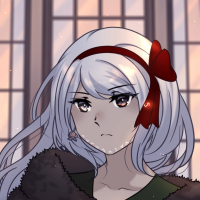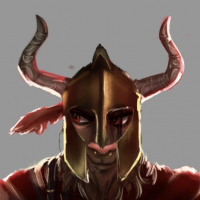Looking for more active discussion? Join our Discord at https://discord.gg/x2s7fY6
Best Of
Re: Post War Thoughts
I enjoyed the war, despite how it turned out to be. I feel like there were quite a handful of miscommunications that went on in the war, and it definitely exacerbated things. There was a lot of freeform opportunities to PK though, and I've never seen Shadow fighters been so pumped up to PK before. Aside from just the PK, the support from the city, at least where Bloodloch was concerned, was phenomenal, proving that you don't have to fight to be useful, and I enjoyed the fact that newly joined novices were also rarring to help out, even if they might not be of use and even if it meant they would die a dozen of times for being militia.
There were some slip-ups here and there from either side when they attacked individuals who were clearly not in the militia, which I think could be better policed by players. I also think that the war has also spurred a lot of PK creativity and troop strategy that I would probably have never seen if we hadn't had the war, and we did have a good hit-back from Spirit in terms of the back and forth engagement.
I do wish we were able to do more with the troops however, because they felt like an afterthought to use, and there are no consequences to losing them or benefits to using them creatively. They don't matter in the end, and what really matters is who PKed better. Which makes troop usage a very sad and potentially useless resource in a war.
What I think would be nice reminders for future wars:
- People joining wars and refusing to be part of the militia. People should be explicitly encouraged to join the militia if they want to participate on the action.
- People shouldn't be afraid to leave the militia if they don't want to take part in it, and they shouldn't be given flak for leaving. However, if you do choose to leave so you can be apart from the PK war lynch, remember you made the choice to leave.
- Getting players to remember that they should try to govern themselves on "how much to be griefy" is always a thin line to ride. Hypnotizing people to kick guards, PKing people just because they were in a room with militia members when they were attacked, etc.
What I feel I want to talk about:
Tether divide, and how much should we feel like we should support our allied city on the same tether despite the fact we may have different city agendas and existing clash of interests. With the tether divide, we're already essentially playing Team Blue vs Team Red for lessers and orrery, so I was honestly ready to see if we could keep it to a city vs city war.
Throughout the war, I have heard the same refrain, "The cities of Spirit are allied in their support for each other, but it is unfortunate that both your cities do not share the same sentiment."
Is it such a bad thing to have independence or nuances of a relationship between cities on the same tether? Bloodloch started a war over the monolith, and it was clear that we had our own objective going into this, so we did not expect Spinesreach to agree with our reason for war, or even come to assist in something that does not even involve them at all on a political level. Is it an expectation that we must jump to each other's aid even if it doesn't match the city's ideals?
For example: through the war, and especially at the tail end of it, I found myself grasping to understand why Enorian could still consider helping Duiran when it was clear they didn't care how many innocents (Spirean hoplite troops marching home) they killed. If they were suspected to be guilty of potential involvement, then they had to die. Enorian clearly was uncomfortable with their actions, but they just seemed to let it be or decided they wouldn't need to address it.
As you can tell, the mindset on both sides differ greatly, and I can tell that it will largely continue to affect any wars that might rage across the game again in the future. So, tldr, what I want to ask for is clarification; how are we expecting cities to behave like in conflict?
There were some slip-ups here and there from either side when they attacked individuals who were clearly not in the militia, which I think could be better policed by players. I also think that the war has also spurred a lot of PK creativity and troop strategy that I would probably have never seen if we hadn't had the war, and we did have a good hit-back from Spirit in terms of the back and forth engagement.
I do wish we were able to do more with the troops however, because they felt like an afterthought to use, and there are no consequences to losing them or benefits to using them creatively. They don't matter in the end, and what really matters is who PKed better. Which makes troop usage a very sad and potentially useless resource in a war.
What I think would be nice reminders for future wars:
- People joining wars and refusing to be part of the militia. People should be explicitly encouraged to join the militia if they want to participate on the action.
- People shouldn't be afraid to leave the militia if they don't want to take part in it, and they shouldn't be given flak for leaving. However, if you do choose to leave so you can be apart from the PK war lynch, remember you made the choice to leave.
- Getting players to remember that they should try to govern themselves on "how much to be griefy" is always a thin line to ride. Hypnotizing people to kick guards, PKing people just because they were in a room with militia members when they were attacked, etc.
What I feel I want to talk about:
Tether divide, and how much should we feel like we should support our allied city on the same tether despite the fact we may have different city agendas and existing clash of interests. With the tether divide, we're already essentially playing Team Blue vs Team Red for lessers and orrery, so I was honestly ready to see if we could keep it to a city vs city war.
Throughout the war, I have heard the same refrain, "The cities of Spirit are allied in their support for each other, but it is unfortunate that both your cities do not share the same sentiment."
Is it such a bad thing to have independence or nuances of a relationship between cities on the same tether? Bloodloch started a war over the monolith, and it was clear that we had our own objective going into this, so we did not expect Spinesreach to agree with our reason for war, or even come to assist in something that does not even involve them at all on a political level. Is it an expectation that we must jump to each other's aid even if it doesn't match the city's ideals?
For example: through the war, and especially at the tail end of it, I found myself grasping to understand why Enorian could still consider helping Duiran when it was clear they didn't care how many innocents (Spirean hoplite troops marching home) they killed. If they were suspected to be guilty of potential involvement, then they had to die. Enorian clearly was uncomfortable with their actions, but they just seemed to let it be or decided they wouldn't need to address it.
As you can tell, the mindset on both sides differ greatly, and I can tell that it will largely continue to affect any wars that might rage across the game again in the future. So, tldr, what I want to ask for is clarification; how are we expecting cities to behave like in conflict?
 Elene
Elene
6
Re: Post War Thoughts
I'm going to post something that some people might not want to hear or disagree with, but it does reflect my personal views and from my conversations with many people in Spirit throughout and after the war, a fairly common view among Spirit.
I absolutely loved the PK, how energetic, galvanised, and united Spirit has been since the start of the war, and how so alive the game felt on both sides. And in the context of a war, PK is definitely important, but behind it all we're actually playing a roleplaying game. It makes sense then that we don't have mechanical objectives, but it's also the lack of mechanical objectives can, and did, led to a very disjointed roleplaying experience.
The simple fact was that Spirit actually just outnumbered Shadow significantly for most times of the day throughout most of the war. There were very few battles where we actually lost. We more or less controlled Mamashi throughout, we managed to kill off far more troops, we mostly led on killstats and avoided deathstats, we managed to organise raids on Bloodloch proper during primetime including one where we killed dozens of guards despite there being many player defenders, Spinesreach was effectively shut out of the war from the start. But despite all of this, we could not actually push our agenda because of the lack of mechanical objectives.
In a roleplaying game, there has to be an acceptance that if you're going into a conflict you might end up having to play the role of the losing side. When either party enters a conflict with no intent on ever playing the losing side no matter what happens during the war, it's no longer for the roleplaying experience. Yeah I know, losing sucks. I hate losing! But I'm not going to pretend to win my sect fights when I clearly did not, and part of me entering into that sect fight was the implicit agreement that I was willing to take a loss. It happens with conflicts with mechanical objectives, so why shouldn't it also happen with conflicts without mechanical objectives?
There are also the pains of how far people will push when it seems like everything is on the table. I appreciate that most players on both sides didn't go too far with this, but there were things some players on Shadow did that left a very sour taste in our mouths and I am certain there are some things players on Spirit, maybe even myself included, did that Shadow felt the same about. While there are some things that I am sure both sides policed, there are also things that would have just slipped through or happened regardless.
Ultimately, I cannot advocate for more wars without objectives such as this one. It was absolutely one of my favourite experiences in Aetolia, but I just get the feeling that it would start feeling less and less amazing as we get more of these with resolutions that are, frankly, quite lame.
I absolutely loved the PK, how energetic, galvanised, and united Spirit has been since the start of the war, and how so alive the game felt on both sides. And in the context of a war, PK is definitely important, but behind it all we're actually playing a roleplaying game. It makes sense then that we don't have mechanical objectives, but it's also the lack of mechanical objectives can, and did, led to a very disjointed roleplaying experience.
The simple fact was that Spirit actually just outnumbered Shadow significantly for most times of the day throughout most of the war. There were very few battles where we actually lost. We more or less controlled Mamashi throughout, we managed to kill off far more troops, we mostly led on killstats and avoided deathstats, we managed to organise raids on Bloodloch proper during primetime including one where we killed dozens of guards despite there being many player defenders, Spinesreach was effectively shut out of the war from the start. But despite all of this, we could not actually push our agenda because of the lack of mechanical objectives.
In a roleplaying game, there has to be an acceptance that if you're going into a conflict you might end up having to play the role of the losing side. When either party enters a conflict with no intent on ever playing the losing side no matter what happens during the war, it's no longer for the roleplaying experience. Yeah I know, losing sucks. I hate losing! But I'm not going to pretend to win my sect fights when I clearly did not, and part of me entering into that sect fight was the implicit agreement that I was willing to take a loss. It happens with conflicts with mechanical objectives, so why shouldn't it also happen with conflicts without mechanical objectives?
There are also the pains of how far people will push when it seems like everything is on the table. I appreciate that most players on both sides didn't go too far with this, but there were things some players on Shadow did that left a very sour taste in our mouths and I am certain there are some things players on Spirit, maybe even myself included, did that Shadow felt the same about. While there are some things that I am sure both sides policed, there are also things that would have just slipped through or happened regardless.
Ultimately, I cannot advocate for more wars without objectives such as this one. It was absolutely one of my favourite experiences in Aetolia, but I just get the feeling that it would start feeling less and less amazing as we get more of these with resolutions that are, frankly, quite lame.
6
Re: Post War Thoughts
I wish there was more for non PKers to do during a war. I mean as Trade Minister of Bloodloch, I held a sigil fund raiser and it went rather well, but outside of that, it would be nice if there was something system side that we could do to help boost the PKers, troops, fortifying the home city, or something. That way there would be more involvement
7
Re: Post War Thoughts
One of the best parts of the Aetolia ‘21. It was a breath of life into the world. It’s hard to get around the fact that very little matters mechanically in Aetolia, your org or character isn’t going to be damaged beyond repair by another character, but it /felt/ like there were things on the line and we were behind the wheel.
 Almol
Almol
7
Re: GOOD THINGS IN LIFE
For the first time in years I am finally financially stable enough to buy xmas presents for more than just my kids!
 Ayastia
Ayastia
13
Re: GOOD THINGS IN LIFE
I know I stopped playing earlier this year very abruptly, so I hope you don't mind me filling in the gaps a bit now. Spirit tether people might have seen this with the other alt I was playing at the time, Aithinne.
I found out I was pregnant in March, but towards the end of the first trimester, we got the news that there may have been some very serious complications. I had to wait a minimum of two months for further testing. I had a lot of trouble coping with the uncertainty and anxiety, and eventually the stress of it all got me to a point where I just couldn't concentrate on the game the way I had always enjoyed playing it before. The later testing ultimately showed there were no issues to worry about, but at that point, I didn't really want to try jumping back in knowing that I would have to dip back out again soon. I haven't ruled out coming back in the future, but for now I can very happily say that I'm too busy with a new baby to think about that anytime soon!
This is Liam!

I found out I was pregnant in March, but towards the end of the first trimester, we got the news that there may have been some very serious complications. I had to wait a minimum of two months for further testing. I had a lot of trouble coping with the uncertainty and anxiety, and eventually the stress of it all got me to a point where I just couldn't concentrate on the game the way I had always enjoyed playing it before. The later testing ultimately showed there were no issues to worry about, but at that point, I didn't really want to try jumping back in knowing that I would have to dip back out again soon. I haven't ruled out coming back in the future, but for now I can very happily say that I'm too busy with a new baby to think about that anytime soon!
This is Liam!

25
Re: Torc + Class Interaction
I was taught that editing is for cowards, but I remembered this thread is about torc.
#deleteTorc
I've always been of the opinion that torc needs to go because its only use case is to expand a class beyond what it can 'typically' do
#deleteTorc
 Almol
Almol
9
Re: Torc + Class Interaction
I've always been of the opinion that torc needs to go because its only use case is to expand a class beyond what it can 'typically' do. A crown (ugh) makes a class do x, but faster. +Int makes it do x, but harder. Torc expands the base functionality, and that is always going to have bizarre use cases, because classes are not designed around having a Torc. Templar being stopped by a broken arm (balanced or not) is by design. Break an arm, you limit them to just x choices. Archivist has to spend energy for a phys aff, as part of the kit. Wayfarer can use slaughter to finish a lock since it has an opportunity cost just like the rest. Anything that works around that, especially with the price tag of Torc, is unhealthy.
Weaponry can work around some of these things (just throw your rapier), but you can 1 access weaponry much easier and 2 balance around that (since dodge ranged, clumsiness, rebounding, etc. exist).
I do maintain that "Archi killed a guy really fast" is a terrible standard, because I've blown people up with it plenty, years ago, and I don't have a Torc. It's atypical in how it plays, which isn't a bad thing- just a different style. If you cure wrong vs an Archivist, you're going to explode. Curing 'wrong' vs DSL clone #12 is also going to get you locked, but we've been fighting that so long it just feels intuitive to cure correctly.
Weaponry can work around some of these things (just throw your rapier), but you can 1 access weaponry much easier and 2 balance around that (since dodge ranged, clumsiness, rebounding, etc. exist).
I do maintain that "Archi killed a guy really fast" is a terrible standard, because I've blown people up with it plenty, years ago, and I don't have a Torc. It's atypical in how it plays, which isn't a bad thing- just a different style. If you cure wrong vs an Archivist, you're going to explode. Curing 'wrong' vs DSL clone #12 is also going to get you locked, but we've been fighting that so long it just feels intuitive to cure correctly.
7
Re: Torc + Class Interaction
Perhaps we could have another Torc.
The Torc of Antitorc, or the Torc of Torcitude.
2k credits to nullify the effects of Torc of Telepathy. 8^)
The Torc of Antitorc, or the Torc of Torcitude.
2k credits to nullify the effects of Torc of Telepathy. 8^)
 Eliadon
Eliadon
7

